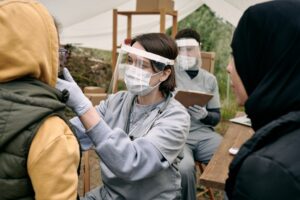They may look like a throwback to the ‘60s, but Terros Health’s two new colorfully decorated vans – affectionately named “Groovy” and “Disco” – are serving a vital role in providing much-needed physical and behavioral health care to racial and ethnic medically underserved individuals experiencing homelessness.
The vans are part of a three-year, $2 million Outpatient Portable Pilot Program funded by the U.S. Department of Health Services’ Substance Abuse and Mental Health Services Administration (SAMHSA).
Terros Health joined the City of Vernon, Calif. and University of California, San Francisco, as the nation’s three organizations awarded SAMHSA-funded minority AIDS/HIV grants focused on homelessness and HIV prevention.
Each of the program’s portable vans is staffed by a registered nurse, a peer outreach specialist and a clinician or counselor who provide everything from basic primary care, vaccinations and infectious disease prevention to mental health and substance use counseling and harm reduction services to those living in encampments, parks and on the streets in metro Phoenix. The team also offers transportation support and housing resources.
The program is timely, considering that 9,642 individuals in Maricopa County experience homelessness each night, according to the January 2023 Point in Time count.
A recent survey completed for the Phoenix Rescue Mission revealed gaps in services and data that was previously collected county-wide.
“Our goal to serve these individuals using an evidence-based, trauma-informed approach to care and Terros Health’s core values of integrity, compassion, empowerment and diversity as a guide,” said Dr. Karen Tepper Hoffman, the organization’s president and CEO.
Terros Health has been supporting the Valley’s diverse communities for more than 50 years. When AIDS became an epidemic in the 1980s, the organization took the lead as a regional educator, screener and crisis trainee long before other providers took notice. With a federal grant, the organization launched Safety Counts in Maricopa County to eliminate or reduce HIV among people who engaged in high-risk sex or intravenous drug use and shared needles. Fast-forward 40 years and Terros Health has trained thousands of caregivers, conducted thousands of free HIV screenings and educated thousands of individuals.
Seeing a record number of Arizonans dying from opioid overdoses, Terros Health also devised the state’s most comprehensive training program to reverse the effects of heroin, fentanyl and prescription opioid medications in minutes. Since 2021, Terros Health’s team conducted training and distributed lifesaving Narcan kits to thousands of citizens statewide.
And the organization has led several first-in-the nation collaborations for other special populations, ensuring Boys & Girls Clubs members, those on probation and individuals with disabilities have access to quality health care.
Terros Health’s colorful Outpatient Portable Pilot Program vans are designed to be a consistent and recognizable presence in the community, with staff members visit designated sites weekly.
The program launched earlier this month and is already shattering its objectives of serving up to 150 unduplicated clients in Year 1; scheduling follow-up appointments for at least 80% of those with behavioral health needs; offering infectious disease testing to all clients; and referring at least 80% of those who test positive for an infectious disease for treatment.
The program also endeavors to engage 75% of participants in housing support; connecting at least 10 individuals per month to short- or long-term housing by Year 2; provide a minimum of 100 clients one or more resources – from health care to employment, education and support networks – to address social determinants of health; and conduct widespread Narcan education and distribute lifesaving Narcan to those in need.
“We want to build rapport and health equity with clients by addressing not only their immediate physical and behavioral health challenges, but also the social determinants of health,” Tepper said. “Ultimately, this will create better individual outcomes, as well as healthy communities.”


















